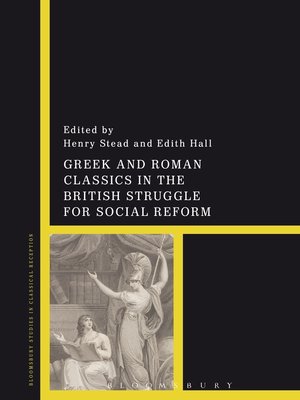Greek and Roman Classics in the British Struggle for Social Reform
ebook ∣ Bloomsbury Studies in Classical Reception
By Henry Stead

Sign up to save your library
With an OverDrive account, you can save your favorite libraries for at-a-glance information about availability. Find out more about OverDrive accounts.
Find this title in Libby, the library reading app by OverDrive.



Search for a digital library with this title
Title found at these libraries:
| Library Name | Distance |
|---|---|
| Loading... |
Greek and Roman Classics in the British Struggle for Social Reform presents an original and carefully argued case for the importance of classical ideas, education and self-education in the personal development and activities of British social reformers in the 19th and first six decades of the 20th century. Usually drawn from the lower echelons of the middle class and the most aspirational artisanal and working-class circles, the prominent reformers, revolutionaries, feminists and educationalists of this era, far from regarding education in Latin and Greek as the preserve of the upper classes and inherently reactionary, were consistently inspired by the Mediterranean Classics and contested the monopoly on access to them often claimed by the wealthy and aristocratic elite.
The essays, several of which draw on previously neglected and unpublished sources, cover literary figures (Coleridge, the 'Cockney Classicist' poets including Keats, and Dickens), different cultural media (burlesque theatre, body-building, banner art, poetry, journalism and fiction), topics in social reform (the desirability of revolution, suffrage, poverty, social exclusion, women's rights, healthcare, eugenics, town planning, race relations and workers' education), as well as political affiliations and agencies (Chartists, Trade Unions, the WEA, political parties including the Fabians, the Communist Party of Great Britain and the Labour Party).
The sixteen essays in this volume restore to the history of British Classics some of the subject's ideological complexity and instrumentality in social progress, a past which is badly needed in the current debates over the future of the discipline. Contributors include specialists in English Literature, History, Classics and Art.
The essays, several of which draw on previously neglected and unpublished sources, cover literary figures (Coleridge, the 'Cockney Classicist' poets including Keats, and Dickens), different cultural media (burlesque theatre, body-building, banner art, poetry, journalism and fiction), topics in social reform (the desirability of revolution, suffrage, poverty, social exclusion, women's rights, healthcare, eugenics, town planning, race relations and workers' education), as well as political affiliations and agencies (Chartists, Trade Unions, the WEA, political parties including the Fabians, the Communist Party of Great Britain and the Labour Party).
The sixteen essays in this volume restore to the history of British Classics some of the subject's ideological complexity and instrumentality in social progress, a past which is badly needed in the current debates over the future of the discipline. Contributors include specialists in English Literature, History, Classics and Art.







